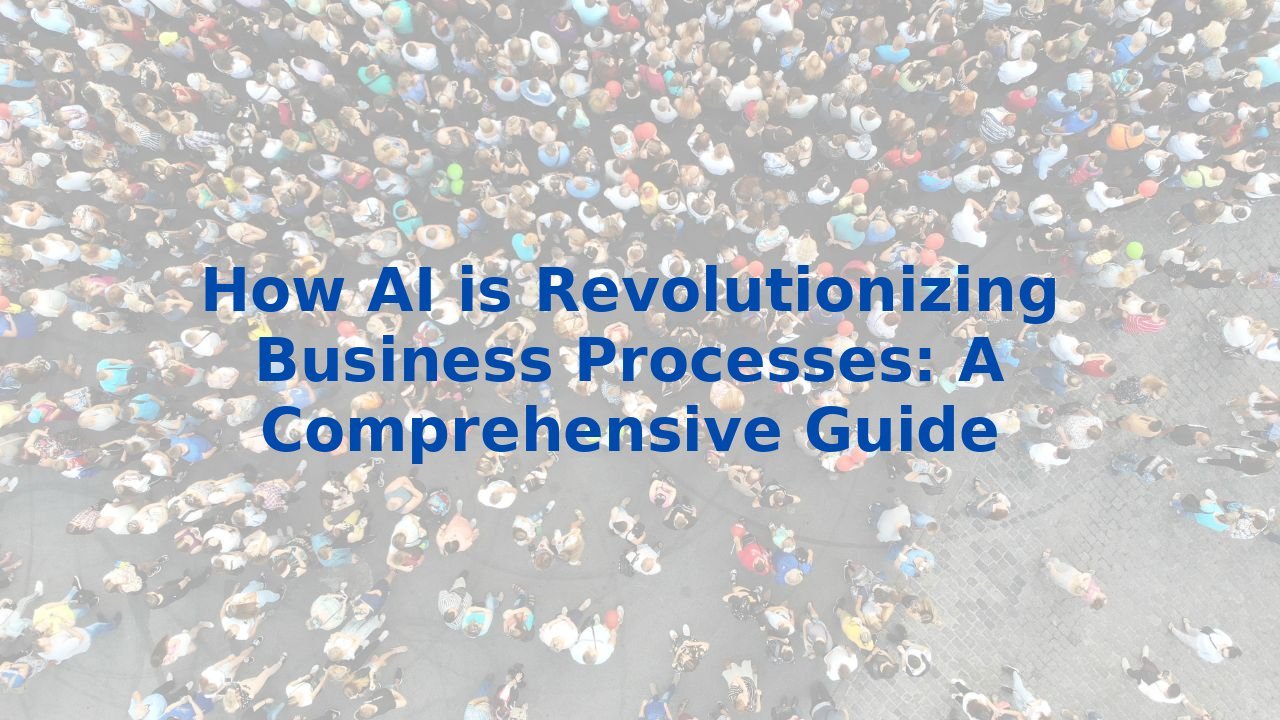How AI is Revolutionizing Business Processes: A Comprehensive Guide
How AI is Revolutionizing Business Processes: A Comprehensive Guide
The rise of Artificial Intelligence (AI) is more than just a trend; it’s a transformative wave that’s reshaping business processes across industries. With its potential to enhance efficiency, productivity, and decision-making, AI stands at the forefront of modern business evolution. This comprehensive guide explores how AI can revolutionize core business processes while emphasizing the importance of preparing your workforce for these changes.
1. Improving Meetings
In today's fast-paced work environment, meetings can often become a time sink. AI addresses this issue by greatly streamlining the administrative tasks associated with meetings. AI-powered voice assistants, for instance, can schedule appointments, transcribe conversations, and summarize key points. By reducing time spent on logistics and administration, teams can focus on what truly matters: strategic discussions that move the organization forward.
2. Enhancing Sales and Marketing
Sales and marketing can greatly benefit from AI analytics embedded in Customer Relationship Management (CRM) solutions. These AI systems provide invaluable insights, allowing sales teams to concentrate their efforts on high-potential clients. AI-driven chatbots elevate customer engagement by offering immediate support and personalized interactions, leading to increased sales and heightened customer satisfaction. Here, automation plays a critical role—not only in efficiency but also in fostering stronger relationships with customers.
3. Assessing and Improving Customer Service
AI has revolutionized customer service by automating quality assessments. With AI at the helm, organizations can swiftly detect anomalies in service delivery, addressing customer complaints effectively. This proactive approach leads to heightened customer satisfaction as businesses can make immediate adjustments to service standards. The end goal is clear: creating a customer-centric culture supported by continuous improvement.
4. Improving Product Development Processes
Generative design software is another vivid example of AI’s impact on product development. This innovative technology generates multiple design options based on specific parameters, which significantly reduces time and cost. By streamlining this creative process, designers can explore a wider range of possibilities that align with market needs, ensuring that final products exceed customer expectations.
5. Automating Content Generation
Content is king in the digital age, and AI is becoming the powerful knight that propels it forward. AI tools can produce engaging articles, product descriptions, and digital content at an astonishing speed. This capacity for automation not only saves time but also ensures a consistent flow of high-quality content, allowing businesses to maintain a strong online presence amid evolving trends.
6. Enhancing the Manufacturing Process
Collaborative robots, or cobots, utilize AI technologies such as machine vision to work alongside humans in manufacturing. This collaboration heightens workflow efficiency and boosts safety measures in the factory. By integrating AI so seamlessly, smaller businesses can more effectively compete with larger manufacturers, leveling the playing field across the industry.
7. Refining Recruitment
Recruitment has also seen a significant transformation through AI. The automation of tasks such as resume screening and candidate matching allows recruiters to identify the most suitable candidates more quickly. AI-driven chatbots provide personalized support to job seekers, enhancing the overall recruitment experience. This dynamic not only makes the hiring process more efficient but aims to create a more engaged candidate pool.
The Role of AI in Business Process Management
The integration of AI in Business Process Management (BPM) is undeniable. By automating repetitive tasks, analyzing vast data sets, and optimizing workflows, AI becomes an essential tool for modern businesses. For instance, AI's data analysis capabilities quickly reveal trends and predict outcomes, providing invaluable insights for decision-making.
Moreover, AI streamlines the process-building aspect, saving organizations time in mapping out and optimizing their operational workflows. The automation of manual tasks further accelerates processes, reduces errors, and offers significant cost savings—all crucial for thriving in a competitive market.
Benefits of Training Employees for AI
Implementing AI is only part of the journey; training your employees is the next critical step. Here are the key benefits of equipping your workforce with the necessary AI skills:
- Enhanced Collaboration: Trained employees can work in harmony with AI tools, ensuring that the full advantages of automation are realized. This collaboration allows teams to focus on higher-level tasks that require human creativity and intelligence.
- Improved Decision-Making: Employees well-versed in AI technology can analyze data more effectively, enabling better-informed decisions and revealing opportunities for ongoing process optimization.
- Adaptability: Knowledgeable employees can swiftly adapt to changes in technology and market demands, a necessity for success in today’s fast-paced business climate.
Conclusion
As we navigate this transformative landscape, the potential of AI to enhance business processes becomes increasingly clear. Whether it’s optimizing meeting efficiency, revolutionizing sales and marketing, or refining recruitment practices, AI opens doors to improved productivity and customer satisfaction. However, organizations must prioritize training their employees for AI to ensure they maximize these benefits. By fostering an AI-ready workforce, businesses position themselves at the forefront of innovation, ready to thrive in an ever-changing world.



